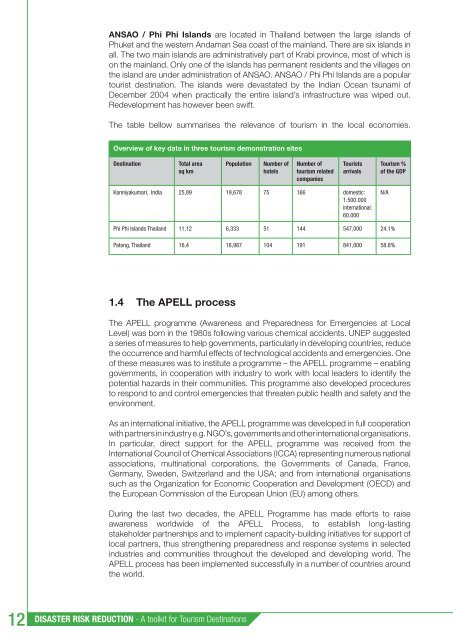Disaster Risk Reduction - A Toolkit for Tourism ... - PreventionWeb
Disaster Risk Reduction - A Toolkit for Tourism ... - PreventionWeb
Disaster Risk Reduction - A Toolkit for Tourism ... - PreventionWeb
Create successful ePaper yourself
Turn your PDF publications into a flip-book with our unique Google optimized e-Paper software.
ANSAO / Phi Phi Islands are located in Thailand between the large islands of<br />
Phuket and the western Andaman Sea coast of the mainland. There are six islands in<br />
all. The two main islands are administratively part of Krabi province, most of which is<br />
on the mainland. Only one of the islands has permanent residents and the villages on<br />
the island are under administration of ANSAO. ANSAO / Phi Phi Islands are a popular<br />
tourist destination. The islands were devastated by the Indian Ocean tsunami of<br />
December 2004 when practically the entire island’s infrastructure was wiped out.<br />
Redevelopment has however been swift.<br />
The table bellow summarises the relevance of tourism in the local economies.<br />
Overview of key data in three tourism demonstration sites<br />
Destination<br />
Total area<br />
sq km<br />
Population<br />
Number of<br />
hotels<br />
Number of<br />
tourism related<br />
companies<br />
Tourists<br />
arrivals<br />
<strong>Tourism</strong> %<br />
of the GDP<br />
Kanniyakumari, India 25,89 19,678 75 166 domestic:<br />
1.500.000<br />
international:<br />
60.000<br />
N/A<br />
Phi Phi Islands Thailand 11,12 6,333 51 144 547,000 24.1%<br />
Patong, Thailand 16,4 16,987 104 191 841,000 58.8%<br />
1.4 The APELL process<br />
The APELL programme (Awareness and Preparedness <strong>for</strong> Emergencies at Local<br />
Level) was born in the 1980s following various chemical accidents. UNEP suggested<br />
a series of measures to help governments, particularly in developing countries, reduce<br />
the occurrence and harmful effects of technological accidents and emergencies. One<br />
of these measures was to institute a programme – the APELL programme – enabling<br />
governments, in cooperation with industry to work with local leaders to identify the<br />
potential hazards in their communities. This programme also developed procedures<br />
to respond to and control emergencies that threaten public health and safety and the<br />
environment.<br />
As an international initiative, the APELL programme was developed in full cooperation<br />
with partners in industry e.g. NGO’s, governments and other international organisations.<br />
In particular, direct support <strong>for</strong> the APELL programme was received from the<br />
International Council of Chemical Associations (ICCA) representing numerous national<br />
associations, multinational corporations, the Governments of Canada, France,<br />
Germany, Sweden, Switzerland and the USA; and from international organisations<br />
such as the Organization <strong>for</strong> Economic Cooperation and Development (OECD) and<br />
the European Commission of the European Union (EU) among others.<br />
During the last two decades, the APELL Programme has made ef<strong>for</strong>ts to raise<br />
awareness worldwide of the APELL Process, to establish long-lasting<br />
stakeholder partnerships and to implement capacity-building initiatives <strong>for</strong> support of<br />
local partners, thus strengthening preparedness and response systems in selected<br />
industries and communities throughout the developed and developing world. The<br />
APELL process has been implemented successfully in a number of countries around<br />
the world.<br />
12<br />
DISASTER RISK REDUCTION - A toolkit <strong>for</strong> <strong>Tourism</strong> Destinations

















